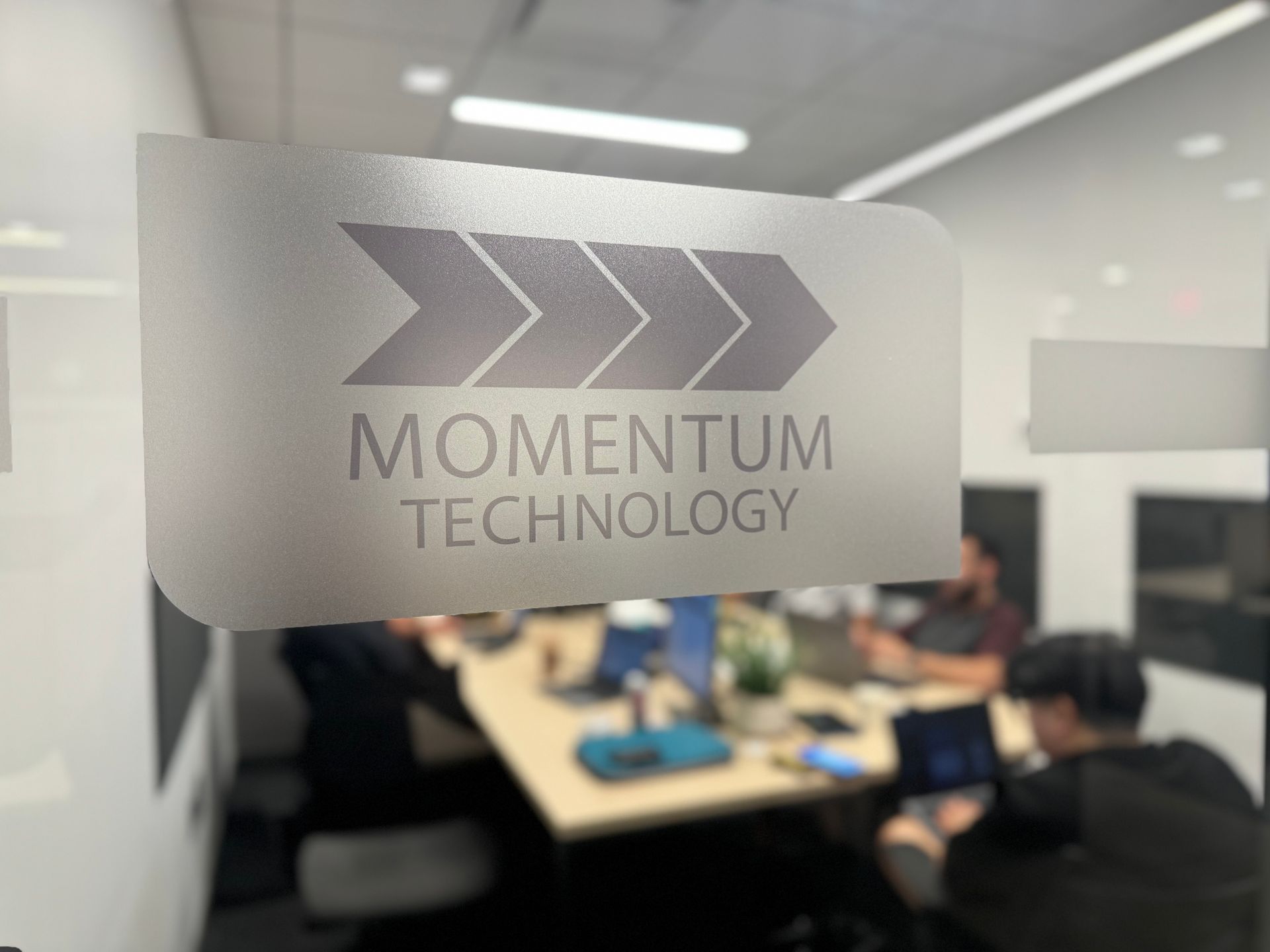Empowering Team Members to Think Like Business Owners
Momentum Technology • August 29, 2024
A Path to Shared Success

Fostering an entrepreneurial mindset among team members is a game-changer for any business. At Momentum Technology, we believe that when team members think like business owners, they become more invested, innovative, and committed to the company's success. One of the key aspects of this mindset is understanding the costs involved in running a business and how these costs impact the bottom line. Here’s how we can help our team develop this crucial perspective.
1. Transparent Communication
Transparency is the cornerstone of fostering an ownership mentality. Regularly sharing financial information with everyone in the business helps them understand the company's economic realities. By holding quarterly financial briefings and discussing key performance indicators (KPIs), we can demystify the numbers and show how day-to-day decisions affect overall profitability.
2. Cost Awareness Training
To think like a business owner, team members need to know what things cost. This includes everything from office supplies and marketing campaigns to labor costs and overhead expenses. Offering training sessions that break down the various costs associated with running the business can provide valuable insights. These sessions can also cover the basics of budgeting and financial planning, empowering team members to make cost-effective decisions in their roles.
3. Incentive Programs
Incentive programs that reward cost-saving initiatives and innovative ideas can motivate team members to think more strategically. By linking bonuses or other rewards to the company's financial performance, individual contributors can see a direct correlation between their actions and the company’s success. This not only drives engagement but also encourages a sense of ownership and accountability.
4. Cross-Departmental Collaboration
Encouraging collaboration across different departments helps team members understand how various functions contribute to the bottom line. When sales, marketing, operations, and finance work together on projects, each person gains a holistic view of the business. This interdisciplinary approach can spark innovative solutions that drive efficiency and reduce costs.
5. Empowering Decision-Making
Giving team members the autonomy to make decisions in their areas of expertise fosters a sense of ownership. When they are trusted to manage budgets, negotiate contracts, or implement new processes, team members are more likely to consider the financial implications of their choices. Providing the right tools and resources for informed decision-making is crucial to this empowerment.
6. Continuous Improvement Culture
Cultivating a culture of continuous improvement encourages team members to regularly seek ways to enhance efficiency and reduce waste. Implementing programs like Lean or Six Sigma can provide the methodologies and skills needed to identify cost-saving opportunities. Recognizing and celebrating these improvements reinforces the importance of thinking like a business owner.
7. Feedback Loops
Establishing regular feedback loops where team members can share their ideas and observations about cost management can uncover valuable insights. Town hall meetings, suggestion boxes, and digital platforms for idea sharing can facilitate this two-way communication. By actively listening and implementing suggestions, business leaders demonstrate that their team's contributions are valued and impactful.
8. Educational Opportunities
Offering educational opportunities such as workshops, webinars, and courses on financial literacy and business management can further enhance team members' understanding of the business. Partnering with local educational institutions or online learning platforms can provide accessible and relevant learning experiences.
Conclusion
At Momentum Technology, we are committed to nurturing an entrepreneurial spirit within our team. By helping our team members think like business owners, we enhance their professional growth while driving the company’s overall success. Understanding costs and their impact on the bottom line is a critical component of this mindset. Through transparency, training, incentives, and empowerment, we can create a workplace where everyone feels invested in our shared future.
By fostering this ownership mentality, we are not just building a more efficient and profitable business—we are creating a culture of innovation, engagement, and shared success. Together, we can achieve great things.

We understand the excitement that comes with developing something new. The thrill of seeing an idea come to life and the eagerness to get it out the door and into production can be intoxicating. However, in our rush to innovate, we must remember the importance of well thought-out processes and the value of collaboration. Ensuring that everyone has a seat at the table is not just a nice-to-have—it’s essential for long-term success. The Risks of Rushing In the fast-paced world of tech, it’s easy to get caught up in the momentum of rapid development. While speed can be advantageous, rushing through processes can lead to oversights, errors, and missed opportunities for improvement. When we neglect to involve all relevant stakeholders, we risk: Overlooking Key Insights: Every team member brings unique perspectives and expertise. By not including them in the process, we miss out on valuable insights that could enhance the final product. Inefficiencies and Rework: Rushing to production without thorough planning often results in issues that need to be addressed later. This can lead to inefficiencies, increased costs, and time-consuming rework. Reduced Morale: When team members feel their voices aren’t heard, it can lead to decreased morale and engagement. Everyone wants to feel that their contributions are valued and that they are an integral part of the process. The Benefits of Collaboration Collaboration and thoughtful planning are the cornerstones of successful development. By ensuring everyone has a seat at the table, we can: Leverage Diverse Expertise: Including diverse perspectives leads to more innovative solutions. Each team member’s unique knowledge and experience contribute to a more comprehensive and robust final product. Improve Efficiency: Thoroughly planning and considering all aspects of a project upfront can save time and resources in the long run. Identifying potential issues early on allows for proactive problem-solving and smoother execution. Boost Team Morale: When team members feel their input is valued, it fosters a sense of ownership and pride in the project. This leads to higher engagement, better collaboration, and a more cohesive team. Implementing Collaborative Processes To ensure that collaboration is a central part of our development process, consider the following strategies: Inclusive Meetings: Schedule regular meetings that include representatives from all relevant departments. Ensure that everyone has the opportunity to share their insights and feedback. Clear Communication: Maintain open lines of communication throughout the project. Use collaboration tools to keep everyone informed and involved. Structured Feedback Loops: Implement structured feedback loops where team members can provide input at various stages of the project. This helps identify potential issues early and allows for continuous improvement. Encourage Participation: Foster a culture where team members feel comfortable sharing their ideas and concerns. Recognize and value their contributions to create an environment of mutual respect and collaboration. We believe that slow and steady truly does win the race. By prioritizing well-thought-out processes and ensuring that everyone has a seat at the table, we set ourselves up for long-term success. Collaboration and thorough planning are not just about avoiding mistakes—they are about creating the best possible outcomes for our projects and our team. Let’s embrace the power of collaboration, leverage the diverse expertise of our team, and take the time to ensure that everything is thought through. Together, we can achieve remarkable things and continue to drive innovation in a thoughtful and inclusive manner.

At Momentum Technology, we believe that fostering a culture of continuous learning is vital for both individual and organizational growth. Encouraging employees to explore new areas beyond their current knowledge not only benefits the company but also ignites passion and enthusiasm among our team members. We've learned that e ncouraging employees to step outside their comfort zones and learn new skills brings a myriad of benefits. Enhanced Problem-Solving: Employees who broaden their skill sets are better equipped to tackle complex challenges from multiple perspectives. This versatility enhances their problem-solving capabilities, leading to more innovative solutions. Increased Engagement: Learning something new can reignite an employee's passion and enthusiasm for their work. When team members are excited about what they’re discovering, it positively impacts their overall job satisfaction and productivity. Career Growth: Acquiring new skills opens up opportunities for career advancement. Employees can take on new roles and responsibilities, paving the way for personal and professional development. Company Innovation: When employees bring new knowledge and skills to the table, it drives innovation within the company. Fresh ideas and approaches can lead to the development of new products, services, and processes. One shining example of this is one of our Technical Support Representatives, who has been diving into the world of QA automation. A Case in Point: QA Automation One of our Technical Support Representatives recently embarked on a journey to learn QA automation, and his dedication and curiosity have been inspiring to watch. Here’s how this initiative is benefiting both the team member and Momentum Technology as a whole: Personal Growth: The representative’s excitement about learning QA automation is palpable. Not only is he gaining new technical skills, he's also experiencing a renewed sense of purpose and motivation in his role. Organizational Benefit: By exploring QA automation, this team member is helping to build capabilities for which we currently don’t have a dedicated role. This proactive approach is adding value to our organization by filling a gap and enhancing our quality assurance processes. Innovation and Efficiency: The new skills being acquired are leading to the development of automation tools that improve efficiency and accuracy in our QA processes. This innovation is crucial for maintaining our competitive edge and delivering high-quality products to our clients. To foster a culture of continuous learning, consider the following strategies: Support and Resources: Provide access to learning resources such as online courses, workshops, and conferences. Encourage team members to take advantage of these opportunities. Mentorship and Collaboration: Pair team members with mentors who can guide them in their learning journey. Promote collaboration and knowledge-sharing among team members. Recognition and Rewards: Acknowledge and celebrate employees who take the initiative to learn new skills. Recognition can be a powerful motivator and reinforce the value of continuous learning. Create Opportunities: Encourage team members to apply their new skills in real projects. This hands-on experience is invaluable for reinforcing learning and demonstrating its practical benefits. We are committed to creating an environment where continuous learning is encouraged and valued. By supporting our employees in their pursuit of new knowledge, we are fostering a culture of growth and innovation. Whether it’s exploring QA automation or any other skill, the enthusiasm and expertise our team members bring to their roles are what drive our success. Let’s continue to inspire and support each other in our learning journeys. Together, we can achieve great things!

The way many companies view punctuality and time management is undergoing a significant shift. At Momentum Technology, we believe the quality of work should take precedence over the exact hours our team members clock in and out. However, navigating this viewpoint requires a balance between flexibility and accountability. Traditionally, punctuality has been a cornerstone of professional conduct. Seeing someone arrive late to the office often carried negative connotations. However, in a world where remote work is becoming the norm, the emphasis is shifting from when we work to how we work. Remote work offers a level of flexibility that allows employees to work when they are most productive. For some, this might mean starting their day early; for others, it might mean working later into the evening. At the end of the day, what truly matters is the quality of the work produced. High-quality work, completed within deadlines, speaks volumes about an employee's dedication and efficiency. If the work is being done well and on time, the specific hours logged become less significant. However, w hile flexibility is important, there are times when punctuality is crucial. When team meetings or collaborative sessions are scheduled, it’s essential to be on time. These moments rely on everyone’s presence to be effective and productive. Additionally, any interaction involving clients or external stakeholders should be treated with the utmost professionalism, including punctuality. Meeting deadlines is also non-negotiable. It’s important to be punctual in delivering work as agreed upon, maintaining the trust and reliability we value. To successfully manage a flexible work environment while ensuring accountability, you'll want to have clear communication with your team. Set clear expectations regarding when timeliness is non-negotiable, and communicate the importance of punctuality for specific events and deliverables. Then t rust your team to manage their time effectively. Encourage responsibility and ownership of their tasks and schedules. And finally, focus on performance metrics and outcomes rather than the exact hours worked. Evaluate employees based on the quality and timeliness of their work. At Momentum Technology, we strive to create a supportive environment where flexibility and accountability coexist. We understand that our employees have diverse working styles and personal commitments. By prioritizing the quality of work and maintaining open communication, we can ensure that everyone is aligned and productive. As we continue to navigate the remote work era, let’s focus on what truly matters: the quality of our work. Remember, it’s not always about the clock-in time but about delivering exceptional results. By balancing flexibility with accountability, we can create a work environment that values both personal well-being and professional excellence.

Remote work has become more than just a trend—it's a new way of life. At Momentum Technology, we believe in leveraging this flexibility to enhance both professional productivity and personal well-being. One of the most exciting aspects of remote work is the opportunity to explore new places while maintaining career responsibilities. Here’s why you should consider taking your work on the road and how it can benefit you. Experience a New City Whether you’re contemplating a permanent move or just need a change of scenery, working remotely from a different city can provide valuable insights. Services like Airbnb and Vrbo make it easy to rent apartments and homes, allowing you to immerse yourself in the local culture and lifestyle. This experience can be incredibly useful if you’re thinking about relocating, as it gives you a real sense of what it would be like to live there. Refresh Your Mind and Boost Productivity Changing your environment, even for a short period, can refresh your mind and inspire new ways of thinking. A new space often brings a new perspective, which can translate into increased creativity and productivity. Working from a cozy cabin in the mountains, a beachside bungalow, or a chic city apartment can provide the perfect backdrop for a burst of professional inspiration. Explore New Cultures and Cuisines Remote work offers a unique opportunity to explore new places, meet new people, and experience different ways of life. Take advantage of local cuisines, cultural activities, and community events. These experiences can enrich your life, broaden your horizons, and provide a well-rounded understanding of the world. Plus, trying new foods and engaging in local traditions can be a fun and enjoyable way to spend your free time. Make Informed Decisions About Relocation If you’re considering a move, spending a week or more in a potential new city can help you make an informed decision. Living in a place temporarily allows you to experience the daily rhythm, commute times, neighborhood vibes, and overall lifestyle. You might discover that a city you’ve always dreamed of isn’t the right fit, or you may find a hidden gem that perfectly matches your needs and preferences. Enhance Work-Life Balance One of the key benefits of remote work is the ability to achieve a better work-life balance. Exploring new places while working can provide a much-needed break from routine, reduce burnout, and improve your overall well-being. When you’re in a fresh environment, you’re more likely to engage in healthy habits, explore outdoor activities, and maintain a positive outlook. How to Get Started Plan Ahead: Choose your destination and accommodation carefully. Ensure that your new workspace has reliable internet and a comfortable setup for your work needs. Also, check with your company's remote work policies to ensure you can work from the location you're planning due to laws and policies around income taxes. Set Boundaries: Maintain a clear distinction between work time and leisure time to stay productive and make the most of your new environment. This will ensure you're fulfilling your professional obligations while also maximizing your personal time. Stay Connected: Keep in touch with your team and clients. Use collaboration tools and schedule regular check-ins to ensure smooth communication. Embrace Flexibility: Be open to adjusting your routine to accommodate new experiences. Flexibility is one of the biggest advantages of remote work. At Momentum Technology, we encourage you to take advantage of the ability to work from anywhere. Exploring new places can rejuvenate your mind, boost your productivity, and provide invaluable insights into potential relocation destinations. Whether it’s for a week or a month, make the most of remote work by immersing yourself in new environments and enjoying all the benefits they have to offer. Safe travels and happy working!

Momentum Technology is proud to announce that our CEO, Amanda Pietrocola, recently had the honor of being a guest speaker at Belmont University. Known for her visionary leadership and commitment to innovation, Amanda shared her journey, insights, and advice with the aspiring entrepreneurs and business leaders of tomorrow. A Journey of Innovation and Leadership Amanda's journey to becoming the CEO of Momentum Technology is a testament to her dedication and entrepreneurial spirit. Speaking to a crowd of Belmont business and entrepreneurship majors, Amanda’s lecture centered on how her growth began as an intern and evolved into her becoming the CEO of her own business before the age of 30. She emphasized the importance of faith and hard work to her success as she recounted the challenges and triumphs she faced while building Momentum Technology. Her story highlighted how resilience and a strong belief in her vision propelled her forward and resonated deeply with the students, offering them a real-world example of how passion and perseverance can lead to remarkable achievements. Empowering the Next Generation Amanda’s presentation was not just about her own journey but also a call to action for the students at Belmont University. She encouraged them to embrace their unique ideas, take calculated risks, and continuously seek opportunities for growth and improvement. Her advice was particularly relevant for her entrepreneurial-minded audience, many of whom are preparing to launch their own ventures. One of the key messages Amanda conveyed was the significance of fostering a positive company culture. At Momentum Technology, she has cultivated an environment where creativity, collaboration, and community impact are highly valued. Momentum Impact, the company’s philanthropic branch, has contributed over $250,000 to various charities since 2021, demonstrating a strong commitment to giving back to the community. Engaging with Students The event at Belmont University also included a Q&A session during which students had the opportunity to engage directly with Amanda. They asked insightful questions about the specifics of her decisions, as well as the successes and challenges she faced. Amanda’s responses were candid and inspiring, offering practical advice and encouraging the students to pursue their goals with confidence. Looking Ahead Amanda’s guest appearance at Belmont University is just one example of her dedication to mentoring and inspiring the next generation of leaders. At Momentum Technology, we believe in the power of education and the importance of sharing knowledge and experiences to foster growth and innovation. As we continue to push the boundaries to privacy protection, we remain committed to supporting initiatives that empower individuals and communities. Amanda’s engagement with the students at Belmont is a testament to this commitment, and we look forward to many more opportunities to inspire and be inspired.

Discover how Momentum Technology prioritizes respect, empathy, and collaboration in fostering a positive work environment. Explore the importance of supporting team members through challenges, maintaining professionalism, and upholding organizational values. Learn how open communication and accountability contribute to a thriving workplace culture where every team member can flourish.

At Momentum Technology, our journey with office spaces has been a direct reflection of our commitment to flexibility and employee well-being. We understand that our team’s needs evolve, and we’ve adapted our workspace models to reflect those changes. Here’s a look at our journey through various office setups and how we’ve landed on our current work plans. Starting in a Shared Space: When we first began, our team thrived in a vibrant shared coworking space. This environment fostered creativity and collaboration, allowing us to bounce ideas off each other, build strong working relationships, and fuel our early growth and innovation. Moving to a Private Office: As we grew, we moved to a private office, a transition that provided us with more space and privacy, allowing for focused work and a sense of ownership over our environment. While this setup worked well for a time, we soon realized that it limited the flexibility we valued. Returning to the Coworking Space with a Private Office: To strike a balance, we returned to the coworking space but maintained a small private office. This hybrid model gave us the best of both worlds: a collaborative environment for team interactions and a quiet space for concentrated work. It was a step toward recognizing the diverse needs of our employees. When we opened a second office in Tennessee, we quickly realized this same model would work well for our second location. Embracing the Day-Pass Model: Now, we’ve taken our commitment to flexibility a step further by moving to a day-passes for our New Jersey team. For many, the daily commute was a significant burden, adding hours to their workday and taking time away from home. By trusting our employees with their time and promoting a healthy work-life balance, we’ve found a model that works best for everyone. Meanwhile, our Tennessee team is still thriving in a private office inside of a coworking space. Why Flexibility Matters: At Momentum Technology, we believe that flexibility is key to maintaining a happy and productive workforce. Our employees are our greatest asset, and their well-being is our top priority. By offering flexible work options, we enable our team to maintain a work-life balance and boos their productivity. The Benefits of Our Current Model: Our current day-pass shared space model offers numerous benefits, including in-person collaboration, remote work, and enhanced team member morale . Looking Ahead: W e remain committed to adapting our workspace models to meet the evolving needs of our team. With the right flexibility and the right team, we can ensure that everyone is happy, productive, and thriving in their work environment. At Momentum Technology, our journey with office spaces is a reflection of our core values: flexibility, trust, and employee well-being while also understanding that every team is different. We’re excited to continue evolving and supporting our team in the best ways possible!

Discover how Momentum Technology's Director of Engineering, Jim Caldwell, empowers employees through practical self-defense training. As an army veteran and seasoned martial artist, Jim shares his expertise in transforming fear into confidence. Read about how this class is helping participants feel more prepared and capable of defending themselves in any situation. Learn how knowledge and skills can shift the mindset from helpless to empowered, fostering a safer and more confident community within our organization.
